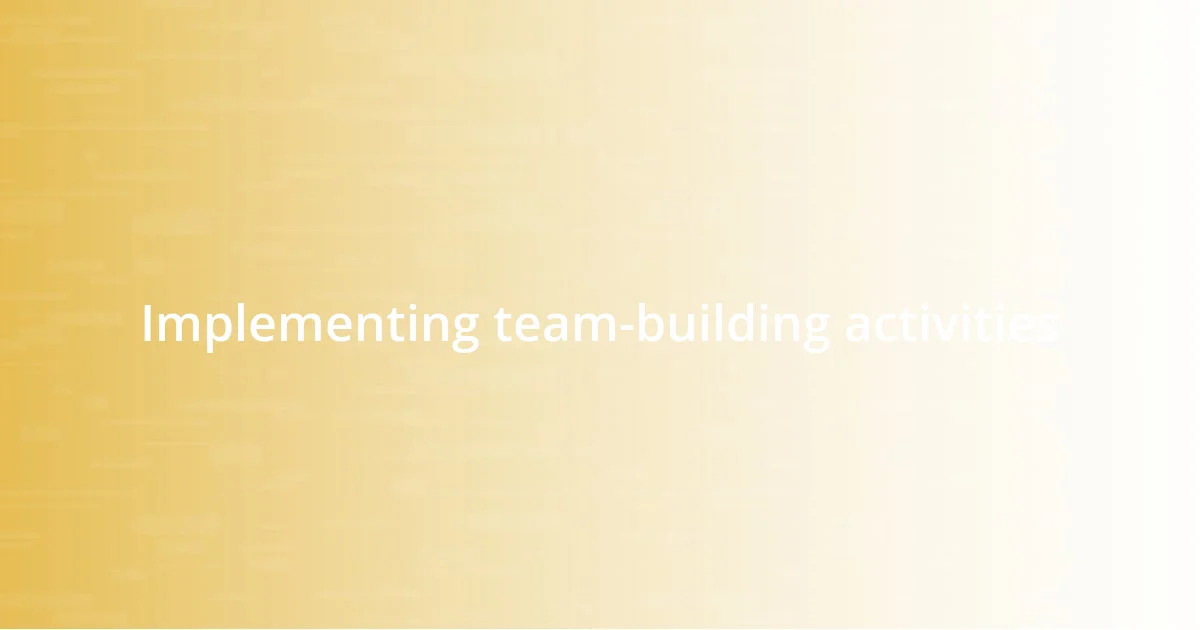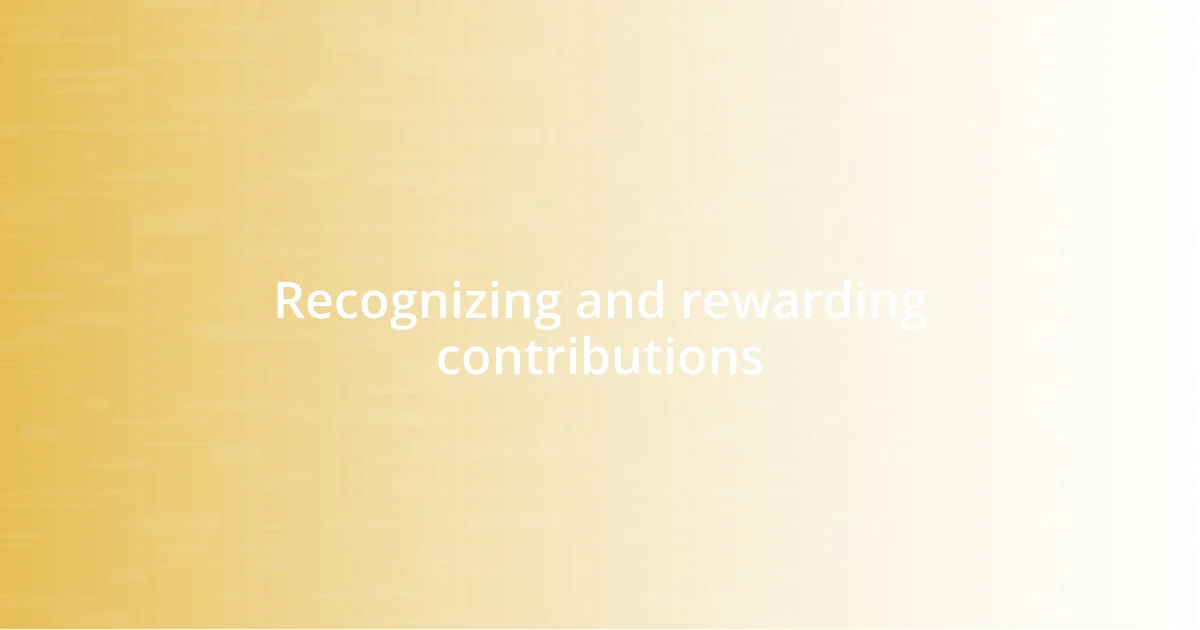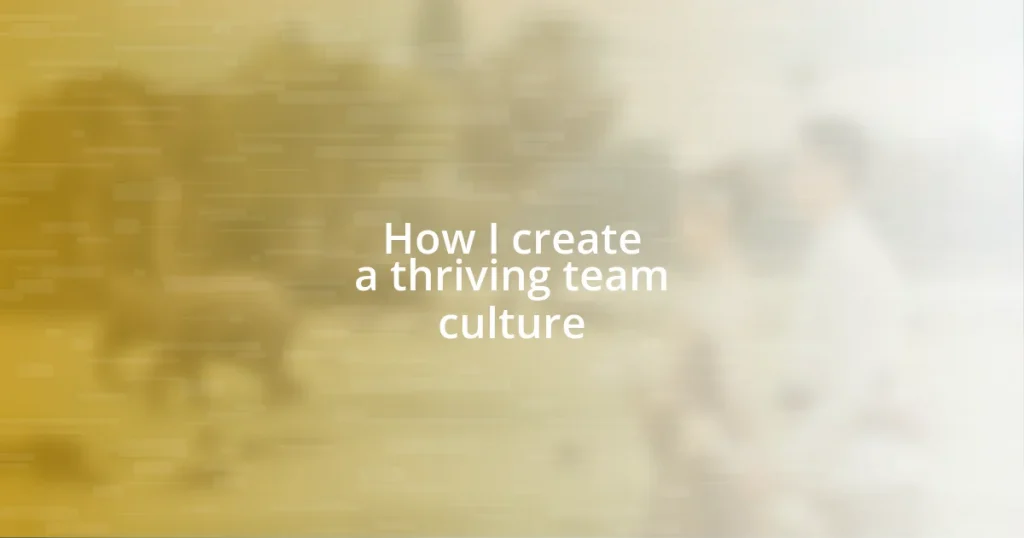Key takeaways:
- Strong team culture fosters a sense of belonging, enhances productivity, and attracts talent by creating an environment of support and collaboration.
- Establishing core values through open dialogue and shared experiences strengthens the team’s foundation and guides daily actions.
- Regular recognition, team-building activities, and promoting diversity contribute to a motivated, inclusive, and evolving team culture.

Understanding team culture benefits
One of the most significant benefits of a strong team culture is the sense of belonging it fosters among team members. I still recall a time when I joined a new team that genuinely prioritized teamwork; it felt warm and welcoming, almost like family. Isn’t it incredible how having that support can motivate individuals to put in their best effort?
A thriving team culture significantly boosts productivity and creativity. I remember a project where we celebrated small wins as a team—those moments transformed our atmosphere. Suddenly, brainstorming sessions became vibrant discussions instead of mundane meetings. Could the simple act of celebrating our achievements really ignite such enthusiasm?
Moreover, a positive team culture attracts and retains talent. When people know they’re joining an environment that values openness and collaboration, it makes them more excited to join and commit. I’ve seen team members flourish in such an environment, discovering hidden strengths they didn’t even realize they had. Isn’t it fascinating how culture can unlock potential in individuals?

Identifying core team values
Identifying core team values starts with open conversations. I remember when we gathered for a team retreat; each member shared what they believed were essential qualities for our success. It was eye-opening to see how personal experiences shaped our collective vision. By embracing diverse perspectives, we began to uncover values that resonated with everyone.
Key values we identified included:
- Trust: Building and maintaining trust among all team members.
- Collaboration: Emphasizing teamwork and the sharing of ideas.
- Respect: Valuing each individual’s contributions and opinions.
- Innovation: Encouraging creative thinking and embracing change.
- Accountability: Taking responsibility for individual and team outcomes.
Recognizing these core values wasn’t just a checklist; it was a journey. I felt a surge of unity as we aligned on these principles, creating a shared foundation that intertwined our personal motivations with our goals as a team. When values are deeply embedded in the culture, like threads in a tapestry, they guide our actions and decisions every day.

Encouraging open communication practices
Encouraging open communication practices is vital in cultivating a thriving team culture. I remember when my team implemented regular feedback sessions. Initially, there was some hesitance, but soon those conversations transformed into a safe space where ideas flowed freely. The sheer relief was palpable when team members realized they could express concerns or suggestions without fear of judgment. Isn’t it amazing how a simple structure like that can create openness?
It’s important to lead by example. Early on in my career, I witnessed a leader who actively sought input from everyone, regardless of their role. That made a lasting impression on me. I realized that when leaders model open communication, it encourages everyone to follow suit. I now strive to create environments where team members feel empowered to share their thoughts openly.
Incorporating tools like anonymous surveys can also enhance communication. I’ve found that when team members have a chance to voice their opinions without attaching their names, honest feedback pours in. It builds trust over time because those opinions are valued. Does it surprise you how much insight can come from an anonymous comment? I’ve learned that it’s a powerful way to hear unfiltered voices, allowing for continuous improvement in our culture.
| Open Communication Practices | Benefits |
|---|---|
| Regular Feedback Sessions | Encourages trust and honesty |
| Leading by Example | Inspires others to share |
| Anonymous Surveys | Facilitates honest feedback |

Implementing team-building activities
Implementing team-building activities can significantly enhance our team culture. I recall organizing a fun outdoor retreat where we tackled a ropes course together. The laughter and shared challenges not only broke down walls but also fostered connections that went beyond our daily tasks. Have you ever noticed how shared experiences create a sense of belonging? It’s magical how just a day away from the office can transform dynamics.
I’ve also learned that the effectiveness of these activities depends on genuine participation. Once, we tried a virtual escape room during a remote work period. At first, I was skeptical about whether it would engage everyone, but to my surprise, it became a highlight of our week. Watching colleagues strategize and support each other felt energizing, demonstrating the bond we’ve built. It’s an exciting reminder that regardless of distance, shared pursuits can strengthen our connections.
Finally, while team-building activities are enjoyable, I’ve discovered they yield the best results when linked to our core values. For instance, after identifying trust and collaboration as key pillars, we implemented collaborative workshops. During these sessions, the focus wasn’t just on fun; it was about reinforcing how we can rely on one another. Isn’t it empowering to realize that these activities can be a catalyst for reinforcing our team’s identity and purpose?

Recognizing and rewarding contributions
Recognizing and rewarding contributions is crucial for fostering a motivated team. I remember a time when a colleague went above and beyond to lead a project that succeeded against all odds. To show our appreciation, we organized a small team lunch to celebrate their efforts. Watching their face light up when we presented a simple thank-you card really made it clear how much recognition can boost morale—don’t you think a little gratitude can go a long way?
Throughout my experience, I’ve found that regular recognition doesn’t only celebrate individual achievements; it also strengthens the entire team. For instance, we adopted a “kudos board” where team members could post shout-outs. It became a daily reminder of the amazing efforts taking place around us. It’s incredible how seeing others’ hard work acknowledged encourages everyone to strive for excellence. How do you celebrate the wins in your team?
Finally, I believe that rewards need to be meaningful and aligned with team values. After a successful quarter, we once treated our team to a day off as a reward for their dedication. The sense of gratitude and teamwork sown by that gesture fostered a renewed commitment among us. I’ve come to realize that it’s not the scale of the reward that matters; it’s the thought behind it. Isn’t it inspiring how small gestures can build a culture of appreciation and elevate team spirit?

Promoting diversity and inclusion
Promoting diversity and inclusion is vital to building a thriving team culture. I remember sitting in a meeting where we discussed our team’s demographics. It hit me that we were lacking representation from various backgrounds. This realization spurred us to implement strategies that not only attracted diverse talent but also fostered an inclusive atmosphere where everyone felt valued. How often do we consider the richness that different perspectives can bring to our problem-solving?
In my experience, celebrating diversity goes beyond hiring; it’s about nurturing a culture where every voice is heard. Once, we organized an informal “culture day,” where team members shared their traditions and experiences. The stories that emerged were eye-opening and enlightening, which reminded me how our differences could be a source of strength rather than division. Isn’t it powerful to see how much we can learn from one another?
Additionally, I’ve discovered that inclusion isn’t just a buzzword; it requires ongoing effort. I initiated regular feedback sessions where everyone could discuss their experiences in the workspace. It was enlightening to hear different viewpoints, and it deepened our collective understanding. This commitment to openness created an environment of trust, making it easier to address challenges collaboratively. Don’t you think fostering such a dialogue can lead to a more cohesive and empowered team?

Sustaining and evolving team culture
In my journey of nurturing team culture, I’ve learned that sustaining and evolving it requires constant reflection and adaptation. I recall a time when we conducted a team survey to gauge our culture’s health. The results were mixed; while most appreciated our atmosphere, a few voiced concerns about communication. This prompted us to implement weekly check-ins to ensure everyone had a voice. Have you ever faced similar challenges in your team?
As we focused on improving communication, I noticed a significant transformation. Initially hesitant team members began sharing their opinions more openly, leading to richer discussions and innovative solutions. I remember one meeting where an introverted colleague shared a brilliant idea that turned the direction of our project. It made me realize how fostering an open environment often reveals hidden gems within our team. It truly struck me how much value lies in actively listening to every member’s contribution.
Evolving culture isn’t just about addressing concerns; it’s also about celebrating growth. We recently marked our fifth anniversary as a team, and I proposed that each member reflect on their personal development. The stories shared were inspiring, highlighting how our culture nurtured individual strengths and aspirations. Witnessing the pride in their eyes made me think—how often do we pause to acknowledge our evolution together? Making this reflection a regular practice can keep our culture alive and vibrant, ensuring it evolves to meet our ever-changing needs.















